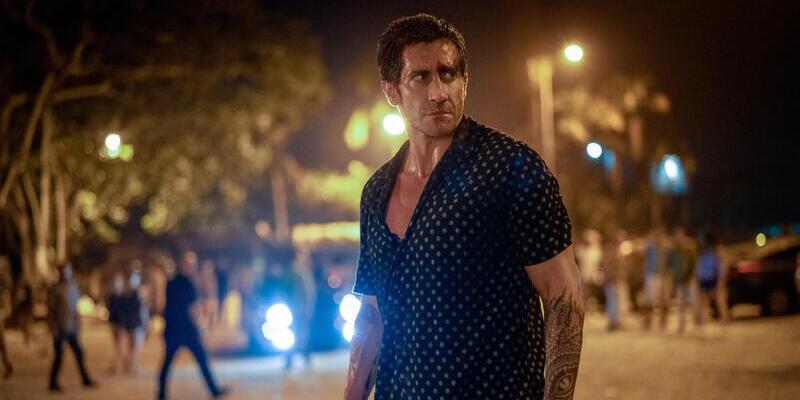
Review by
Eric Hillis
Directed by: Doug Liman
Starring: Jake Gyllenhaal, Daniela Melchior, Billy Magnussen, Jessica Williams, Joaquim de Almeida,
Conor McGregor, Lukas Gage

In the mid 1980s Hollywood seized upon a formula for success: make an Elvis
movie but ditch the songs. It's a simple formula: a charismatic male lead is
thrown into a dramatic situation based around his job, where he juggles a
male adversary and a female love interest. Most of them starred Tom Cruise,
for few were better equipped to replicate Elvis's charm.
Cocktail: Elvis becomes a barman. Top Gun: Elvis joins the air force. Days of Thunder: Elvis is a Nascar racer. But perhaps the best Elvis movie of the era
starred Patrick Swayze. No, not Dirty Dancing, which is also very much an Elvis movie, but 1989's
Road House, in which Elvis is a bouncer.

Much of the nostalgia for '80s Hollywood is unwarranted and largely based
around Gen-Xers first seeing a slew of iconic movies at an age when they
hadn't yet developed any critical faculties. But the one thing you can say
in '80s Hollywood's favour is that it knew how to nail a formula, how to
tell a simple story without too much fat. 1989's Road House is
roughly the same length as Doug Liman's remake and yet it whizzes by
in comparison. It knows exactly what sort of entertainment its six-pack
swilling Friday night audience is after and delivers it in spades. To quote
the infamously on-point tagline of '80s slasher Pieces, "It's exactly what
you think it is."
Liman's Road House doesn't really know what it is, probably
because the Hollywood of 2024 doesn't know what it's audience wants now that
Joe Sixpack has finally turned his back on superhero movies. It initially
leans into the Elvis vibes by having its action play out in sunny Florida,
and there are more than a few nods to the aforementioned
Cocktail, including a needle drop of The Beach Boys' 'Kokomo' (a song I thought was
the definition of cheese as a kid in 1988 but which now warms my aging
heart). But then at a certain point it becomes a Charles Bronson movie, with
some mean-spirited nastiness that jars with the sunny setting and wisecrack
laden script.

The difference between the 1989 film and its 2024 incarnation is visually
represented by their leading men's torsos. Swayze's Dalton was lean but
ripped, with decidedly chiselled abs, while Jake Gyllenhaal's update
is more bulk and less focussed definition. Where Swayze's workout regime was clearly
designed to make him look good, Gyllenhaal's would appear to have been more
geared towards getting big, and if that isn't a metaphor for the contrast
between the Hollywood of the past and today's version...
Both movies have essentially the same plot: Dalton is hired to become the
head bouncer at a rowdy roadhouse only to find he's up against forces more
powerful than a bunch of knife-wielding drunks, and romances a local doctor
in the process. But in this version that simple premise becomes muddled and
overcooked. Some of the original's supporting characters have been erased.
The prominent role of bluesman Jeff Healey has been replaced by a series of
anonymous acts performing behind chicken wire at the titular venue. Gone too
are the seductress figure played by Julie Michaels and Dalton's old coot
landlord. In their place are a bookstore owner and his precocious daughter,
who are introduced at the start only to be ultimately dismissed as cheap
fodder for a final act revenge plot (making these characters black, as is
Jessica Williams' road house owner, and giving Dalton a Latina love
interest played by Daniela Melchior, sets the film up for avoidable
white saviour accusations). Ben Gazzara's memorable villain is replaced of
course by a much younger actor in Billy Magnussen, who has the
necessary punchable face but whose viking physique makes his snivelling
shtick hard to swallow. Magnussen towers over both Gyllenhaal and the main
henchman played by Conor McGregor. The notorious MMA fighter delivers
a performance that is both objectively terrible and supremely entertaining.
I'd complain about the character being an offensive Irish stereotype were
McGregor not himself a real life offensive Irish stereotype. A new addition
in this version is a corrupt local sheriff (Joaquim de Almeida), a
character that the movie can't figure out what to do with and who ultimately
just gets in the way of the central beef. Unlike Swayze and Kelly Lynch, who
smouldered on screen together, there's a notable absence of chemistry
between Gyllenhaal and Melchior, as though the actors are all too aware of
the inevitable online age gap discourse.

Much of the fun of the original came from the anarchic nature of the bar
fights, which were no more sophisticated than those found in a 1930s
b-western but which had a raw, bone-crunching verisimilitude. They were the
sort of messy brawls you could imagine stumbling across in small town
America, where blokes get drunk on a six pack of those pocket-sized cans
they drink over there. In this version the fights are a different kind of
messy, in that you can't see what's happening most of the time because the
camerawork and editing are over-compensating. Why hire an actual MMA fighter
if you're not going to let the audience see his moves?

Road House is on Prime Video from
March 21st.

